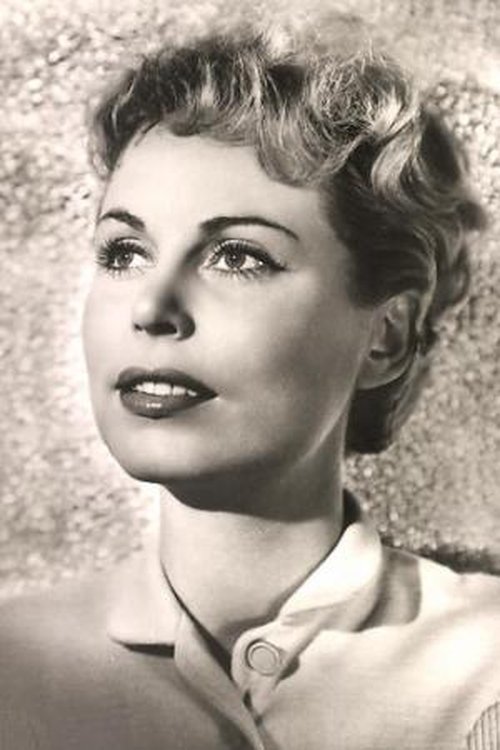
|
Mein Onkel Theodor oder Wie man viel Geld im Schlaf verdient (1975)
Character: Tante Erika
The somewhat indolent father Traugott Wurster looks after his six sons while his wife works in a butcher's shop. One day, when Traugott falls into a mysterious prolonged sleep, mother Wurster is forced to give the children to relatives. Markus is sent to the stuffy Uncle Theodor, who turns into a childhood friend under his influence. Mother Wurster also "rents" the sleeping Traugott to a furniture store, which uses him to advertise mattresses in the shop window.
|
|

|
Unter den Sternen von Capri (1953)
Character: Nina
A comedy about a white yacht and four attractive young women who want to impress a sailing club with their seaworthiness. A fifth "girl" turns out to be a photo reporter in disguise, who joins the voyage instead of his sister in order to get ahead professionally. Two of the women eventually get hitched.
|
|

|
Meine 99 Bräute (1958)
Character: Greta Föhn
Nicki Montag is considered a true Casanova in the Munich suburbs. However, this is obviously not only down to him, but also to the numerous women who are only too happy to fall for his advances. With the help of his work-shy friend Jonny, Nicki beguiles one woman after another in a variety of ways. It doesn't matter whether it's the daughter of a greengrocer, a real lady or a proper artist's girl. In the case of the demanding Mrs. Consul Hale, it is even Nicki who is conquered.
|
|

|
Das Glück läuft hinterher (1963)
Character: Margot Schallbecher
Follows the life of several different people in 1960s in Germany for a few days. The story begins, when a juvenile criminal steals an old woman's handbag in a post office and throws it into a parking car, when he feels observed. But there was a lot of money in that bag, and thereby a dozen fortunes become entwined.
|
|

|
Ich fahre Patschold (1964)
Character: Charlotte Patschold
Building contractor Rainer Patschold gets into financial turmoil by his own fault. Without thinking much about it, he has invested advances and loans for the modest 'Waldfrieden' housing estate in the large and promising 'Seydlitzdamm' project. Now, of all times, sales manager Wirsing plays the sick man, trying to show Patschold how irreplaceable he is for the company. To make matters worse, chief secretary Liebstöckel also drops out, collapsing under the double burden of work stress and an unhappy love affair. In addition to the business crisis, Patschold's private life is also under strain: his neglected wife is on the verge of a nervous breakdown, and his demanding mistress Doris is closing in on him with bag and baggage. But the clever Patschold finally knows how to help himself with the help of his equally shrewd chauffeur Göhrke.
|
|

|
Beiß mich, Liebling (1970)
Character: Frau Brenner
A descendant of Count Dracula returns to his ancestral village to take revenge on the people who destroyed his ancestor.
|
|
|
|

|
Die feuerrote Baronesse (1959)
Character: Juliane
During the final days of the Second World War, British intelligence sends an agent to Berlin to try to discover the secrets of Nazi Germany's nuclear weapons program.
|
|

|
Die Sünderin (1951)
Character: Irmgard
Going from a dysfunctional family into a life of prostitution, Marina finally finds happiness and comfort with unsuccessful artist Alexander. However, a brain tumor threatens to make him blind and only an expensive operation can save him.
|
|

|
Ich denke oft an Piroschka (1955)
Character: Greta
Andreas, a young German student comes to Hungary on an exchange programme. In the Hungarian village he falls in love with the stationmaster's daughter Piroschka and spends much of his time with her. They have an enchanting summer until Andreas gets an invitation to join another young woman at a nearby resort. Piroschka is jealous and follows him there, causing trouble. It takes a long time for Andreas and Piroschka to even talk to each other again. When Andreas has to leave Hungary at the end of his holiday, he is determined to return some day.
|
|

|
Wir Wunderkinder (1958)
Character: Vera von Lieven
Kurt Hoffmann′s satire concerning Germany′s development during the first half of the 20th century tells the story of two schoolmates - Hans and Bruno. They could not be more different. While Hans is ambitious and must always work hard for his career, it seems that the happy go lucky Bruno is carefree.
|
|

|
Vater braucht eine Frau (1952)
Character: Gisela
A widowed father advertises for a new maid, but his children secretly seek a woman to be his new wife.
|
|
|
|













